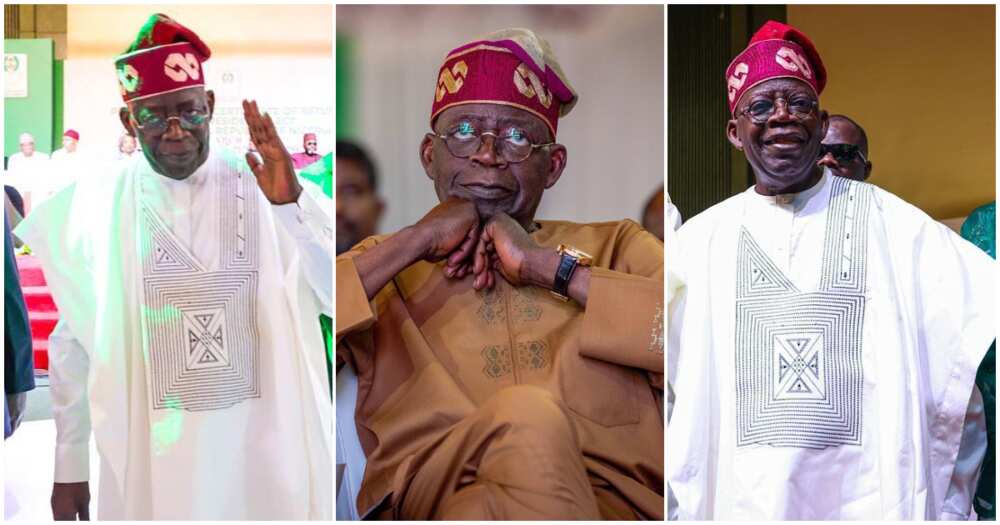From Opposition to Leadership: A Look Back at Tinubu's Political Journey
If you look at Nigeria, there is no politician with an accurate and consistent succession arrangement like Bola Tinubu.”
This was how Bola Ahmed Adekunle Tinubu’s long term ally and former colleague in the class of 1999 state governors, Olusegun Osoba, described the new Nigeria president in a 2020 interview with The Guardian.
Victory for Tinubu in the Saturday, February 25 2023 presidential election is like the final destination of a political journey which began over three decades ago.

Source: Facebook
The 71-year-old's political career began in 1991, when he joined the Social Democratic Party (SDP). In 1992, he was elected to the Senate, representing the Lagos West constituency in the short-lived Nigerian Third Republic.
Tinubu always wins
Undefeated in every election he has contested in, Tinubu, popularly called BAT (the acronym of his name), realised his lifelong presidential dream in 2023. However, the road to Aso Rock Presidential Villa was no bed of roses.

Read also
Inauguration Day: 5 prominent endorsements that helped Tinubu win 2023 presidential election
PAY ATTENTION: Follow us on Instagram - get the most important news directly in your favourite app!
Tinubu’s victory which was ratified on Wednesday March 1, 2023, had its genesis in the former Lagos governor’s days during the difficult times where he fought with like minds through the instrumentality of National Democratic Coalition formed in 1994, Afenifere and other platforms to challenge the military junta which annulled the June 12, 1993 election of late Chief Moshood Kashimawo Olawale (MKO) Abiola. Those moments inspired his 'Renewed Hope' campaign slogan.
The new Nigerian leader made a near-anonymous entry into the political terrain during the transition programme of General Ibrahim Babangida. He was a member of the Peoples Front political association founded by the late Shehu Yar’adua but the group and others were denied registration as political parties by the junta. Instead, it established two parties, the SDP and the National Republican Convention. The Yar’adua group moved into the former and it was under the party that Tinubu was elected senator in July 1992.

Read also
Firing of Daura, alleged religious bias: 7 things Buhari’s ‘star boy’, Yemi Osinbajo will be remembered for
After Sani Abacha, the military successor of Babangida, scrapped the transitional democratic institutions, including the National Assembly, threw Abiola into jail and went after his supporters with an iron fist, Tinubu joined in the formation of the National Democratic Coalition (NADECO) which sustained a campaign against military rule.
His (Tinubu's) involvement in the pro-democracy struggle forced him into exile.
When he returned home after the June 1998 death of Abacha, he teamed up to form the Alliance for Democracy (AD) and was elected the first governor of Lagos state in the Fourth Republic the following year.
He was the only one among the six governors of the party, all of them in the Southwest, to retain office in 2003 after Olusegun Obasanjo’s Peoples Democratic Party (PDP) won most states in the region.
Tinubu achieves his biggest dream — against odds
In a presidential election involving top candidates, Tinubu polled 8,794,726 votes to defeat 17 other candidates.

Read also
2023 polls: Atiku, Obi, Tinubu risk jail term for religious and ethnocentric campaigns, Electoral Act reveals
His two closest opponents, former vice president Atiku Abubakar of the PDP and former Anambra state governor Peter Obi of the Labour Party, are calling for the cancellation of the February poll, alleging that it was tainted by voter suppression and the failure of the Independent National Electoral Commission (INEC) to upload polling units results from the over 176,000 polling stations to a web portal as promised.
It was the first time he would be running for president, whether in the party primaries or general elections, yet he triumphed. Even the colossal Muhammadu Buhari had to try four times.
His victory means that he took the prize on first attempt, just like Shehu Shagari, Obasanjo and Umaru Musa Yar’adua before him.
In farewell speech, Buhari reveals why Tinubu won 2023 presidential election
Meanwhile, Legit.ng earlier reported that President Muhammadu Buhari said Nigerians were right to elect Tinubu as the country's next president, noting that he was the best among the presidential candidates who contested the 2023 election.
Buhari made this known in his farewell broadcast monitored by Legit.ng on Sunday, May 28.
Source: Legit.ng
